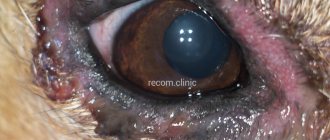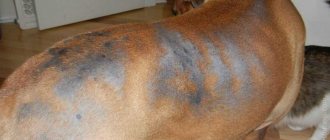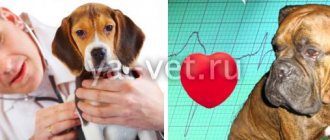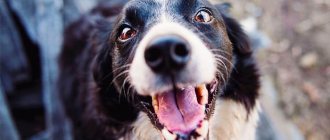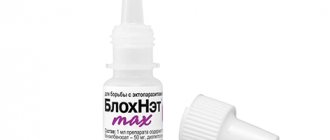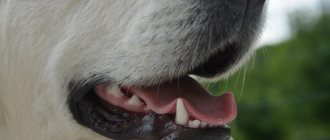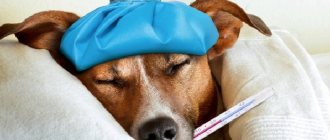Our pets are also susceptible to various diseases, one of which is a violation of the digestive process - bloating. There can be many reasons for the onset of the disease, from an incorrectly selected diet to serious pathology leading to death. Pay attention to your pet's condition after eating: if bloating is noticeable after eating and is eliminated with medication, your pet's health is not in danger. Adjust your diet and pay more attention to the animal. And if your dog’s health becomes worse, immediately seek veterinary help.
Signs of the disorder
There are two stages of bloating: acute and chronic. Each of them has its own symptoms. In any case, if your pet completely refuses food, does not drink water (this is very dangerous due to dehydration), and his stomach is very swollen, do not hesitate, go to the veterinarian! Often, the dog drools, he lies down and does not want to get up, he lies on his side. The biggest danger is the acute form, which can easily lead to death.
Acute form
If you notice that your dog's abdominal cavity is enlarged, keep an eye on him. If the dog does not want to move, this is the first sign of an acute form of bloating. The dog becomes restless or, on the contrary, lethargic and apathetic. If the case is severe, poisoning with toxic products occurs, severe pain and discomfort appears, and stupor develops. Fermentation intensifies in the stomach, and rumbling is heard. Under the accumulated gases, the stomach expands and diarrhea and vomiting are observed.
Chronic form
Symptoms in the case of chronic pathology are not so pronounced, but they also need to be controlled. When the animal is in a healthy state, check the parameters of the widest part of the peritoneum and the pet. Use a measuring tape for this and write down the indicators. If the owner knows the approximate parameters of the dog, it will be easier for him to determine the presence of a problem and its scale.
Reasons why a dog farts often
Passing off gas is a natural process for dogs and puppies.
If gases are released too often, in large quantities and with a fetid, putrid odor, then this is a reason to contact a veterinarian and figure out the cause of your pet’s possible illness.
The release of intestinal gases in animals is a normal process that accompanies the digestion of food.
Causes of increased gas production in a pet:
- Swallowing food while eating. A large amount of air accumulates in the intestines and stomach, which comes out either by belching or through the anus.
- Wrong diet. Excess carbohydrates and protein in food; these components are difficult to digest. The norm of carbohydrate food per day is no more than 33%. The protein food allowance is subtracted from the age and breed of the dog.
- Unnatural body position during feeding - the pet eats lying down and swallows air; spreading paws on a slippery floor can cause difficulty in getting food into the stomach.
- Constipation – Gas builds up and cannot be released, creating bloating.
- An allergic reaction – the dog’s body may reject and not digest any foods, resulting in disorder in the intestines and stomach.
- Dysbacteriosis disrupts gas exchange in the intestines and leads to bloating and sudden release of gases.
- Impairment of the intestines' ability to function properly can occur due to various types of inflammation.
- Infection or bacteria in the intestines interferes with the healthy functioning of the organ.
- Tumors in the intestines.
- Viruses.
Normal removal of gases from the body occurs within two hours after eating.
Accumulation of gases (flatulence)
If you notice that your dog has a bloated belly and is passing gas frequently, he has flatulence. There may be several reasons: from indigestion to intestinal blockage. In this case, other symptoms are present: vomiting, diarrhea, complete refusal to feed. If the dog is not in critical condition and is able to walk, make it run, this will reduce the passage of gases. You can give special medications that will make her feel better. Smecta or activated carbon will do. At home, you can also give a cleansing enema and reduce the amount of carbohydrates in the menu. Increasing walks and physical activity will also help resolve the issue.
When to Call a Vet If Your Dog Farts
- Dog farts have an odor, especially putrid or foul-smelling
- Flatulence accompanied by vomiting, diarrhea or constipation
- No appetite, eyes dull and sad, no desire to play
- The release of gases is not a one-time event, but an ongoing process. That is, the dog experienced interesting sensations more than one evening, and this lasts from day to day.
Chocolate is dangerous for dogs. Moreover, in such a large quantity as 100 g. This is written about here. In our case, everything worked out fine and the very next day Topa was again sniffing at the cabinets in the hope of finding something else tasty.
Intimate problems that cause loud rumbling in the stomach and unpleasant sounds are not unique to humans. In pets, this deviation is observed less frequently, which raises questions from their owners about why the dog farts. Problems of a physiological nature disappear on their own, but pathological ones require consultation with a veterinarian.
Unplanned pregnancy
The second possible reason is unplanned pregnancy in bitches. Mating could occur without the knowledge of the owner if the dog was left to its own devices for a long time. In this condition, symptoms such as:
- engorgement, enlargement and change in color of the nipples;
- changes in the pet's behavior;
- refusal of some food;
- nausea or vomiting.
In this case, you should immediately show the animal to a doctor - only he will be able to clarify the timing and normality of gestation.
Forms of flatulence
Why does my dog fart often? Animals, like their owners, have several types of deviations. Flatulence occurs in acute, delayed and chronic forms. With the last pronounced symptoms, there is no pathology, the general condition of the pet remains at the same level.
The latent course of the disease eventually leads to dysfunction of the pancreas and liver. Impaired functioning of the dog's organs provokes problems with digestion of food and causes increased bloating. The dog's belly begins to resemble a swollen drum. Veterinarians associate this condition with feeding, for example, Labradors and Spitz dogs, cheap industrial feeds based on legumes and soy.
Diarrhea in a dog
The acute course of the pathology is dangerous for the dog. It manifests itself:
- constant anxiety, frequent movement around the apartment;
- whining and trying to attract the owner’s attention;
- a tense and swollen abdomen;
- attacks of vomiting and diarrhea;
- deterioration of appetite, in difficult cases, complete refusal to eat;
- change in gum color to a grayish or bluish tint.
Important! If these clinical signs appear, the dog should be taken to a veterinarian. The clinic will conduct a diagnostic examination that will show the presence of intestinal pathologies and the qualitative characteristics of digestive enzymes.
The main causes of bloating in dogs
As we said earlier, there can be plenty of reasons for the appearance of bloating. The most common include an incorrectly selected diet or helminth infection. If you feed your animal rarely (or perhaps too often) or with different foods, do not be surprised by flatulence. Helminthiasis is a common disease in pets, so do not forget about preventive measures and taking medications. Parasites provoke enzyme deficiency and digestive system disorders.
A common problem is dysbiosis, which is also accompanied by bloating and other dyspeptic symptoms. Bloating can occur when there is severe damage to the biliary system: diseases of the gastrointestinal tract (pancreas, liver, gall bladder).
Improper feeding
The most common cause is an incorrectly adjusted diet. If you feed the animal once a day, but a lot, the dog will overeat. Then he drinks a large amount of water and goes for a walk. After a heavy meal or physical activity on the way home, the dog may experience salivation, regurgitation and distension of the abdomen. The pet's behavior changes: it becomes restless, walks around the house and changes its favorite resting place. Further, the condition may worsen, the dog will become depressed and weaken. Collapse may occur.
Fluid accumulation
A common cause of bloating is the accumulation of fluid in the abdominal cavity. The fluid can be of different types: hemorrhage, exudate (cellular fluids similar to pus), urine (if there are microcracks in the bladder). This also includes transudates - colorless liquids that can leak from blood vessels. This phenomenon is called “ascites” and decisive treatment measures must be taken. His life depends on how quickly the pet owner reacts. The disease occurs due to injuries or diseases of organs. Symptoms of ascites include vomiting, frequent urination, drinking too much, heavy breathing and shortness of breath.
Worm infestation
Helminthiasis is a real problem for dogs, which is easy to eliminate. If your pet has not been treated regularly for worms, it is quite possible that bloating is due to this particular problem. Please note that if parasites are not dealt with, they become more numerous and gather in balls in the intestines, causing bloating. Symptoms of the presence of worms in the body:
- shortness of breath, “cough”;
- weight loss;
- refusal to eat, loss of appetite;
- deterioration of coat condition;
- diarrhea or constipation (sometimes alternate);
- skin rashes;
- vomit.
It is worth carrying out the treatment every 3 months, regardless of where the dog lives, on the street or in the house.
Dog's reaction to stress
The swelling and deflation of a dog’s belly can be a reaction to a difficult psychological situation. This could be separation from a beloved owner, loss of puppies from bitches and many other moments. Carefully monitor the animal's condition: you may have to contact a zoopsychologist. Check with your veterinarian about what medication you can give your dog to calm him down.
Tumor in the abdominal cavity
Tumors can be benign (abnormal that does not spread to other tissues) or malignant (cancer). Formation can occur in any part of the peritoneum, even in the lymph nodes or intestines. This is characterized by loss of appetite, diarrhea, vomiting, weight loss, blood in the vomit and feces. The dog's stomach is constantly rumbling and he is bloated. If you observe vomiting, it means that a thin section of the wall of the stomach and intestines is affected by cancer cells. Diarrhea is a lesion of the large intestine. Treatment and saving lives depends on the promptness of veterinary care - the sooner the tumor is examined by a doctor, the better.
Dog swallowing air while eating
If your dog likes to eat quickly, he may swallow air along with the food, which causes excessive gas formation in the intestines. The bowl should be level with the pet's head, since if it is on the floor, the dog will have to literally throw food down its esophagus. Of course, air inevitably gets in there during the process.
Diseases of the gastrointestinal tract
The causes of bloating can also be very serious problems associated with gastrointestinal diseases. These include intestinal blockage, gastric motility disorders, and insufficient enzyme formation. If there are such moments, the animal’s body temperature rises, weight decreases, physical inactivity, and loss of appetite. Enlargement of the abdominal cavity often becomes an additional symptom of peritonitis - this is not uncommon. Purulent inflammation occurs in the peritoneum, and the stomach fills with blood, lymph and exudate. At such a moment, qualified medical assistance is important, otherwise death is possible.
Causes of flatulence
In the normal state, air is swallowed when eating food; in addition, gases are formed during fermentation processes in the intestines under the influence of microflora. Flatulence is associated with a pathological increase in gas formation. Various reasons can lead to it.
The main components of intestinal gases are odorless. Nitrogen, oxygen, carbon dioxide, methane form the basis of intestinal gases in a normal state. Hydrogen sulfide, ammonia, skatole and a number of other compounds with an unpleasant odor make up no more than 1%, but in pathological disorders their share may increase. Factors influencing the composition of intestinal gases:
- bacterial microflora;
- type of feed;
- volume of diet;
- diseases of the small intestine;
- damage to digestive jelly;
- primary infectious diseases.
Diets high in carbohydrates and fiber often lead to flatulence. Increased gas formation is especially common when feeding legumes. Impaired digestion and absorption of carbohydrates lead to increased gas formation, so flatulence is often associated with enteritis. The fermentation of carbohydrates increases, this process is accompanied by abundant formation of gases.
Cheap, unbalanced feeds often lead to feed flatulence. In them, animal proteins are replaced by plant proteins - peas, soy. There is an abundance of fiber and light carbohydrates - bran, grain. Increased gas formation is less common with fat and protein overfeeding. Giving spoiled food also leads to this problem.
The second reason for the accumulation of gases is the swallowing of air by dogs. This is caused by greedy consumption of food. This is especially common in animals with uneven feeding, when instead of dividing the daily intake into several doses, it is given once a day. Dogs also greedily swallow when underfed. Aerophagia is common when dogs are kept in crowded conditions - food competition forces animals to quickly consume food.
When should you take it to the vet?
If the symptoms listed above worsen, you should immediately go to the doctor. At the same time, the dog may whine, the belly will be large, and saliva will flow out profusely. If the urge to vomit appears and the paws are tense, try giving the animal Rehydron to drink or just let it vomit several times. It happens that the pet becomes noticeably better. If vomiting appears frequently during the day, and the vomit is greenish or yellow in color, with a pungent odor, run to the vet!
It is strictly forbidden to neglect the problem and leave your pet with a bloated belly for more than a day. The swelling can displace the ligaments that secure the internal organs, and one careless movement is enough for a bloat to occur.
Reasons to contact a veterinarian
If your dog farts constantly, and each act is accompanied by a repulsive aroma, then he needs a visit to the veterinary clinic. The doctor conducts a visual and palpation examination, based on the results of which further diagnostics are prescribed. The pet will have to undergo tests for dysbiosis, parasites and blood. In difficult cases, an ultrasound of the gastrointestinal tract is performed, and based on the results of the studies, therapy is prescribed.
Examination at a veterinary clinic
A visit to the clinic with a dog is necessary:
- with severe pain syndrome;
- the appearance of foreign particles in feces;
- elevated body temperature.
Important! Ignoring signs of disease and believing that the animal is normal can lead to serious consequences, including the death of the pet.
Treatment and prevention of flatulence in dogs
The method for relieving bloating depends on the clinical picture, more precisely, on whether the dog is in pain. If the discomfort is tolerable, use “soft” methods:
- The source of gas formation is removed from the stomach and intestines - absorbents (Atoxil, Enterosgel, activated carbon), intestinal lavage.
- Reduce pressure on the abdominal cavity - so-called carminative drugs, for example, children's Espumisan for abdominal colic.
- Relieve irritation of the mucous membranes - Almagel, Smecta dissolved in warm water, decoctions of herbs that envelop the intestinal walls.
- Populate the intestines with new beneficial bacteria -
Increased gas production may not bother the dog in any way, but it often causes discomfort to the owners. Dog owners often notice that the dog farts more during physical activity: jogging, climbing stairs, when experiencing strong emotions (even joy) or stress (for example, when a stranger appears in the house).
Ways to help your pet
How to treat flatulence in dogs? The answer to this question is obvious - the etiological factor should be eliminated:
- if the reason is an incorrectly composed diet, it is necessary to remove excess fiber from it and supplement it with fermented milk products with easily digestible proteins;
- when the root of the evil is the inferiority of dry food, it is replaced or enriched with microelements and vitamins;
- if one meal causes flatulence in a dog, the treatment will be to divide the daily norm into 3-4 doses;
- if animals are crowded in one apartment, their “dining rooms” must be separated.
The accumulation of gases in the intestines is more dangerous than their waste through the anus. A hard, swollen belly indicates inhibition of digestion, compression of the pelvic organs and blood vessels.
What should you do if your dog doesn’t fart, but his belly is hard, like a rock, and very rounded? An active walk in the park will help ensure gas emission. Sorbent medications that have a carminative effect will help alleviate your pet’s condition:
- magnesia oxide;
- Activated carbon;
- simethicone;
- White clay.
However, the use of symptomatic drugs will not replace a therapeutic complex to eliminate the underlying pathology:
- in case of helminthiasis, the fur is sanitized with a preparation intended to destroy the identified type of parasite;
- cure for enteritis includes compensatory drugs, antibiotic therapy, and dietary nutrition.

